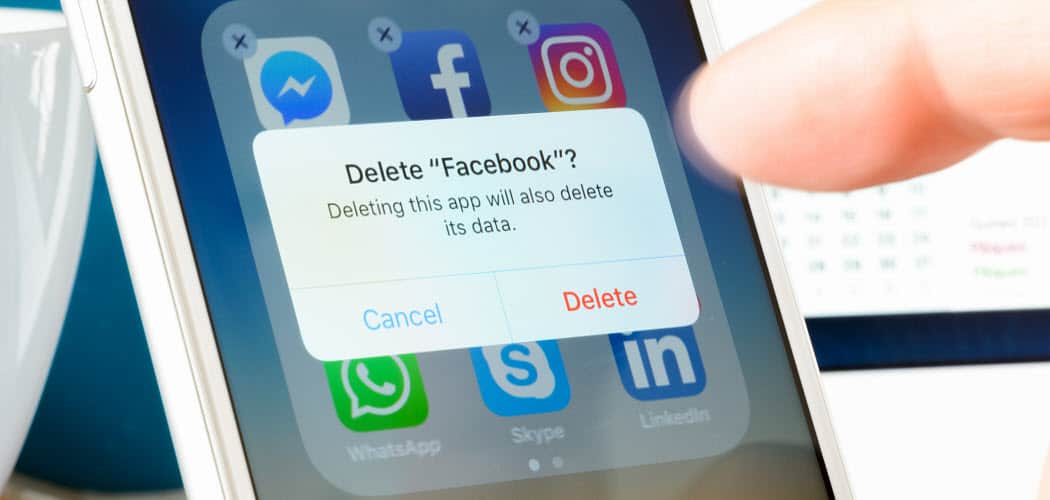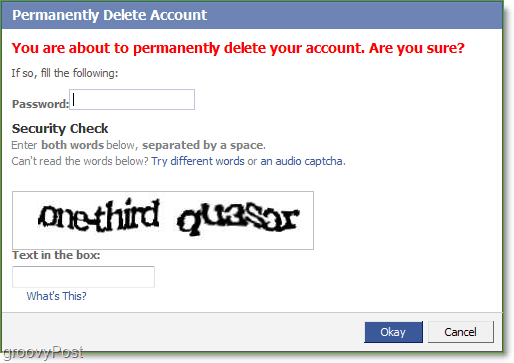How to Delete Facebook Account Permanently Immediately Yahoo Answers

How to permanently delete your Facebook account vs disable or deactivate it. Simply follow this tutorial with screenshots to easily delete your account.
Looking to permanently delete your Facebook account? Not surprising. Over the years, Facebook has seen its share of controversy in regards to the privacy of its users. It's hard to say what sparked all the excitement: Rapid growth of its service? Parents growing awareness of the site and how their kids were using it? The media? Or perhaps it deserved it based on its unethical business practices, privacy policy, or terms of service updates?
Whatever the reason, it's obvious some no longer trust the social giant, and I keep hearing the same question over and over again from my readers:
"Is it possible to delete my Facebook account?"
and
"I managed to deactivate it, so it's deleted right?"
You would think the answer would be fairly straightforward. But it took a lot of digging to come up with the solution surrounding account and profile deactivation — and full-blown account removal from the service. After doing the research and walking through the deceptive complex process, it is apparent that Facebook has done its very best to prevent its customers from leaving. Because if that happened it would, of course, limit the amount of customer data they can scrub from its service.
Personally, I feel Facebook has crossed the line of unethical behavior on this. After all, Facebook doesn't truly provide an interface to delete your account quickly and end your agreement with them regarding the use of your personal data per section 2.1 in its terms of service:
Facebook Terms of Service Agreement – Section 1 & 2 – Sharing Your Content and Information – (updated 11/10/2017)
- PrivacyYour privacy is very important to us. We designed our Data Policy to make important disclosures about how you can use Facebook to share with others and how we collect and can use your content and information. We encourage you to read the Data Policy and to use it to help you make informed decisions.
- Sharing Your Content and InformationYou own all of the content and information you post on Facebook, and you can control how it is shared through your privacy and application settings. In addition:
- For content that is covered by intellectual property rights, like photos and videos (IP content), you specifically give us the following permission, subject to your privacy and application settings: you grant us a non-exclusive, transferable, sub-licensable, royalty-free, worldwide license to use any IP content that you post on or in connection with Facebook (IP License). This IP License ends when you delete your IP content or your account unless your content has been shared with others, and they have not deleted it.
- When you delete IP content, it is deleted in a manner similar to emptying the recycle bin on a computer. However, you understand that removed content may persist in backup copies for a reasonable period of time (but will not be available to others).
- When you use an application, the application may ask for your permission to access your content and information as well as content and information that others have shared with you. We require applications to respect your privacy, and your agreement with that application will control how the application can use, store, and transfer that content and information. (To learn more about Platform, including how you can control what information other people may share with applications, read our Data Policy and Platform Page.)
- When you publish content or information using the Public setting, it means that you are allowing everyone, including people off of Facebook, to access and use that information, and to associate it with you (i.e., your name and profile picture).
- We always appreciate your feedback or other suggestions about Facebook, but you understand that we may use your feedback or suggestions without any obligation to compensate you for them (just as you have no obligation to offer them).
There is plenty there to chew on, especially the areas I've highlighted. I'll speak a bit about this later, let's continue with account deletion and deactivation.
Deactivating Your Facebook Account: The same as Deleting your Account?
Users can deactivate their Facebook account from the user interface without too much trouble. Facebook will ask you to confirm your decision by displaying one of your friends and telling you "Your Friend will miss you."
I'm pretty sure it took, at least, a few days for "P-Diddy" to get over losing me as a FaceBook friend. :)

Once you confirm you want to deactivate your account, be sure to read the fine print. It clearly outlines that account deactivation is not the same as deleting your account/profile. By deactivating your Facebook account, you're merely disabling your ID, however, all your data remains on Facebook servers.

What surprised me was the fact that even after the account deactivates, you can still be tagged in photos, invited to events, etc.. With this in mind, be sure to opt out of emails if that's the path you're going down.

So in short, deactivating your Facebook account is almost worthless. It's Facebook's deceptive and clever practice of luring you into a false sense of security by making you think you've removed your account, personal data, and license to your IP (intellectual property) from the service when you haven't. The wrong part about this is even after your account deactivates, the license granted to Facebook in section 2.1 of its terms…
Section 2.1 of the Facebook Terms of Service
You own all of the content and information you post on Facebook, and you can control how it is shared through your privacy and application settings. In addition:
- For content that is covered by intellectual property rights, like photos and videos (IP content), you specifically give us the following permission, subject to your privacy and application settings: you grant us a non-exclusive, transferable, sub-licensable, royalty-free, worldwide license to use any IP content that you post on or in connection with Facebook (IP License). This IP License ends when you delete your IP content or your account unless your content has been shared with others, and they have not deleted it.
…is stillin effect! And, being that pretty much anything you plug into Facebook is immediately shared with your friends, per the Facebook Terms of service (see highlight in bold,) the license you grant Facebook stays in effect indefinitely even if you do manage to delete your account permanently.
Oh, and it gets better. To re-activate your account, all you need to do is sign in to Facebook or use your Facebook ID to sign in to another service (or post a comment on some sites) and everything is right back where you left it as if you never left – pictures, friends, posts, your IP…
So I think everyone will agree with me in that the Facebook Account/Profile deactivation process is worthless if your goal is to delete your account and remove some of your data or IP from the service. Seriously the "real" good news is there IS a way to delete your account.
How to Really Delete Your Facebook Account
Deep in the bowels of the Facebook help center, you can find the URL that will permanently delete your Facebook account.
Before I show you the link, however, please read the following carefully:
Deleting your Facebook will delete all of your account information and remove your ability to log in to the service. No photos, friends, messages, status updates, etc. According to Facebook, once your account permanently deletes, there is no way to restore your account or your data. With that in mind, please move forward reading all large and fine print.
So let's get started on permanently deleting your profile.
Visit http://www.facebook.com/help/contact.php?show_form=delete_account, click Submit

You'll be asked to confirm. Type in your password and solve the Captcha. Click Okay to continue.

All done, sort of.
How to Make Sure Facebook Permanently Deletes your Account
Even after confirming the deletion of your account, Facebook will only deactivate it, leaving you 14 days to log back in and cancel the entire deletion.

I know what you're thinking: "Really? Fourteen days to delete my data?"
- I completed the scavenger hunt and found the Delete link.
- I saw the big red text warning me my account would be permanently deleted.
- I entered my password.
- I helped translate a book for Google by solving the Captcha puzzle.
- Lastly, I clicked the Okay button
I think it's pretty obvious by now Facebook doesn't consider you a customer from a customer service point-of-view. Facebook is in the data business — more specifically, your data, and it will go to great lengths to keep information including your employment, school history, friends, network, photos, tagged face, etc… which it managed to collect from you over the years in its social web. The 14-day grace period is Facebook's last-ditch attempt to lure you somehow back into the service either accidentally or from some subconscious Facebook addiction in order to abort the account cancellation process.
With this in mind, here are a few tips to make sure you don't "accidentally" log in to Facebook thus aborting your account nuke process.
- Clear your browser cache and delete all cookies – Firefox / Internet Explorer / Secure Wipe w/CCleaner
- Delete the Facebook Application on your iPhone (don't worry, it's free if you ever want to add it again…)
- Avoid clicking the Facebook Share button on any websites you read such as the button below (sorry, couldn't resist)
- 5/5/2010 Update: Reader UXP made a good point in his comment below reminding me that Facebook is also used by many people for single sign-on for commenting on blogs or logging into websites (like digg.com for instance.) Other examples – Facebook chat clients like Pidgin or Adium. If you use these services, post a comment on a blog using Facebook Connect, or log in to a site using your Facebook account during your 14-day waiting period, and your FB account will be reactivated. Ouch… that one is going to hurt if your only Creds on DIGG.com or other sites is your Facebook account.
Now, I can't make any promises that after all this work (and 14 days of course) Facebook will delete your account because it's not my company. This is, however, the process that is laid out on its website (if you managed to track it down). Good luck; unfortunately, you'll need it.

How to Delete Facebook Account Permanently Immediately Yahoo Answers
Source: https://www.groovypost.com/howto/security/permanently-delete-your-facebook-profile-account/